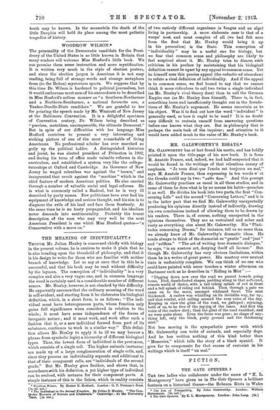THE MEANING OF INDIVIDUALITY:I.
THOUGH Mr. Julian Huxley is concerned chiefly with biology in the present volume, he is anxious to make it plain that he is also treading upon the threshold of philosophy, and that it is his design to write for those who are familiar with neither branch of knowledge. Let us say at once that in this he is successful, and that his hook may be read without difficulty by the layman. The conception of " individuality " is a very complex and also a very vague one, and in common language the word is certainly used in a considerable number of different senses. Mr. Huxley, however, is not checked by this difficulty. He apparently assumes that the ordinary meaning of the word is self-evident, and starting from it he elaborates his biological definition, which, in a short form, is as follows : " The indi- vidual must have heterogeneous parts, whose function only gains full significance when considered in relation to the whole; it must have some independence of the forces of inorganic nature ; and it must work, and work after such a fashion that it, or a new individual formed from part of its substance, continues to work in a similar way." This defini- tion allows Mr. Huxley to apply it to (if we may borrow a phrase from symbolic logic) a hierarchy of different biological types. Thus, the lowest form of individual is the protozoon, which consists of a single cell. The higher animals (metazoa) are made up of a large conglomeration of single cells, and, since they possess an individuality separate and additional to that of their component cells, are "individuals of the second grade." But Mr. Huxley goes further, and shows that, in accordanceavith his definition, a yet higher type of individual can be evolved, with metazoa for their component parts. A simple instance of this is the lichen, which in reality consists
• Woodrow Wilson. By Hester E. Hosford. London : G. P. Putnam'S Sons. Ds. 8id. net.)
t Vhs lisdivisluisi is ths•Anistal-Kingdom. By :titian-S. Huxley. " The Cam, kridge Manuals of Science and Literittans." Cambridge : At the University ?mnas. [1s. net.] of two entirely different organisms (a/tuagrui and an alga) living in partnership.. A more elaborate cage-is' that of a wasps' neat, and most complex of all. (we bad felt sure from the first that Mr. Huxley would bring it up in his peroration) is the State. This conception. of "individuality" may be a. useful one for biology, but we fear that common sense and philosophy are. likely ''to feel sceptical about it. Mr. Huxley tries to disarm such criticism in his preface by maintaining that his biological definition cannot be upset by any appeal to common sense. Yet he himself uses this precise appeal (the reduefio ad absurdum) to refute a rival definition of individuality. And if the appeal is to common sense, we feel bound to say that we cannot think it more ridiculous to call two twins a single individual (as Mr. Huxley's rival theory does) than to call the German Empire one (as Mr. Huxley does himself). There is, in fact, something loose and insufficiently thought out in the founda- tions of Mr. Huxley's argument. He seems uncertain as to his. object. Was it to find out how the word " is generally used, or how it ought to be used ? It is no doubt very difficult to restrain 'oneself from answering questions before one knows what they are. But in philosophy that is perhaps. the main task of the inquirer; and attention to it would have added much to the value of Mr. Huxley's book.


























































 Previous page
Previous page